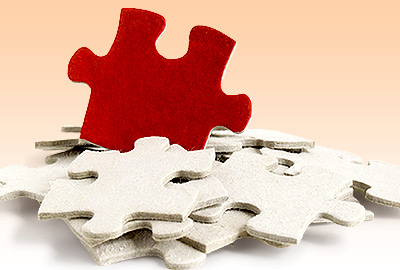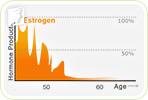Perimenopause is a time of great change for a woman in many ways. Approaching menopause - and with that, the end of her childbearing years - brings numerous changes to the body, but while the majority of these are physical, some cannot be seen. Memory loss is one such symptom; as a woman goes through menopause, she may find it harder to process, absorb, and recall information, notice that concentrating is difficult, or struggle to adapt to changes in routine. These are all indicative of the menopausal memory issues sometimes referred to collectively as “brain fog”.
Hormones and Memory
Estrogen is a hormone that affects the cognitive functions via its influence on the vascular and immune systems, affecting the activity of the hippocampus and of memory-regulating neurotransmitters in the brain and enabling healthy memory formation.
When a woman is in her forties and early fifties, estrogen production declines as the body prepares for menopause. This causes a hormonal imbalance that can impair short-term memory, making concentration, adaptation to changes in routine, and processing, storing, and consciously retrieving information more difficult.
Other Exacerbating Factors
The hormonal changes that primarily cause brain fogs can also result in numerous other symptoms that can trigger or worsen memory loss. Depression, anxiety, and stress are common during perimenopause, and these conditions can cause distraction, lack of interest, and tiredness that makes it hard to absorb information and later recall it. Other sleep-disturbing symptoms, like night sweats and insomnia, can also have this effect.
Dealing with Menopausal Memory Loss
Menopausal memory loss can be combated through a series of lifestyle and dietary alterations.
The most import treatment facet for brain fogs is to keep the cognitive functions stimulated and agile. This is easier and more fun than it sounds; reading, playing card or board games, doing puzzles, or playing brain-training applications on a daily basis will go a long way in improving memory. Regular participation in aerobic exercise has also been shown to considerably reduce memory issues during menopause.
In terms of diet and habits, cutting down on alcohol intake is a good idea, as regular consumption can dull the cognitive functions and result in sleep disorders. Removing stimulants that can be sleep-obstructive, like spicy foods and caffeine, is also a good idea, as tiredness only makes memory issues worse. Try to follow a healthy, balanced diet and drink plenty of water. Drinking infusions with specific memory-enhancing herbs, such as ginseng, ginkgo, and sage could also help. Read about foods for preventing memory lapses.
Upon recognizing the symptoms of menopausal memory loss, it's important not to panic. Becoming frustrated is not going to help matters; what you are experiencing is biological and natural, but you do not have sit by and simply allow the problem to take hold. Make time to enhance your memory using the suggested techniques, and remember that, like other skills, memory can be strengthened and improved. Read about tips to avoid memory loss.
Sources
- Better Health Channel. (2012). Alcohol-related brain impairment. Retrieved June 6, 2014, from http://www.betterhealth.vic.gov.au/bhcv2/bhcarticles.nsf/pages/Alcohol_related_brain_damage?open
- Food and Drug Administration. (2010). Coping with Memory Loss. Retrieved June 6, 2014, from http://www.fda.gov/forconsumers/consumerupdates/ucm107783.htm
- Henderson, V.W. (2008). Cognitive Changes after Menopause: Influence of Estrogen. Clinical obstetrics and gynecology, 51(3), 618-626. doi: 10.1097/GRF.0b013e318180ba10
- Greendale, G.A. , Derby, C.A. , Maki, P.M. (2012). Perimenopause and Cognition. Obstetrics and gynecology clinics of North America, 38(3), 519-535. doi: 10.1016/j.ogc.2011.05.007
- Uchida, S. & Kawashima, R. (2008). Reading and solving mental arithmetic problems improves cognitive functions of normal aged people: a randomized controlled study. Age, 30(1), 21-29. doi: 10.1007/s11357-007-9044-x




